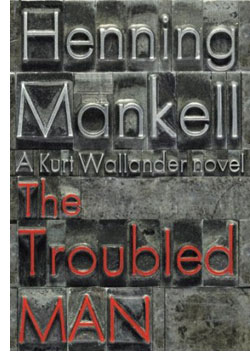 |
 |
 Henning Mankell
Henning Mankell
The Troubled Man
Reviewed by: Rick Kleffel © 2011
Alfred A. Knopf / Random House
US First Edition Hardcover
ISBN 978-0-307-59349-8
Publication Date: 03-20-2011
374 pages; $26.95
Date Reviewed: 04-20-2011
Index:
Mystery
General Fiction
Kurt Wallender is tired. He is closing in on himself. At the age of fifty-five, he's bought a house, his first since his divorce. He's not slipping into a nook in the city. He's invested in an old farmhouse, away from other people. He can't get away from himself. No matter where he is, the mirror shows him the same story. He is becoming more and more like his father. This is not how he wants his story to end, but then, we have so little control over our own endings, even in an age when it should be quite simple.
Henning Mankell has quite a bit of control over Kurt Wallender's ending, even if he never envisioned it back in 1991 when he wrote the first novel featuring the morose detective, 'Faceless Killers.' Mankell has kept Wallender around for twenty years, and in 'The Troubled Man,' he manages the unique feat writing a novel about a tired, troubled man that is lively and engaging even as it dives into matters murky and dark.
Mankell's novel has the detailed, gnarly feel of a life lived with regret. Wallender's daughter has met a man she loves and the result finds Wallender at a dinner with the man's parents. The father, Hakan Von Enke, takes Wallender aside during the celebration and reveals himself to be nearly as troubled as Wallender. He's haunted by the part he played in a series of events that transpired nearly thirty years ago. Wallender's instinct kicks in, but it doesn't tell him much. Not long after, Van Enke disappears, and Wallender cannot resist the mystery.
Readers who have never read a Wallender novel by Mankell will find this book, mired in memory, quite easily readable. It works well on its own. But Mankell is summoning up a lot of history in 'The Troubled Man,' both personal and political. The world is not treating Wallender well, and how he copes with his own potential disintegration is a key part of the pleasure this novel provides.
Mankell's evocation of aging in the 21st century is a powerful, plot-driven externalization of what happens to us as individuals age, and what happens to us as nations age. There's a perception that we're all supposed to sail off into a rosy sunset, that things just keep getting better, but we all know the odds are against it. The house always wins. Wallender is a complicated character who is terrified of becoming less so. It's an interesting twist. He's compelling to read about, and those who surround him — his daughter, Linda, his colleagues, his ex-wife — care about him in a manner that makes the reader care about them. There's a level of detail here that has the feel of everyday life.
Mankell's plot mirrors the murky state of Wallender's life, as the dead hand of politics long-thought forgotten and buried reaches into the present to hold the hearts of characters we care about hostage. Even as every moment feels entirely naturalistic, Mankell maintains a driving tension that does not let up until the last words on the last page. As Wallender has aged, so have we. If he is afraid of what the mirror may show, then perhaps we should be as well.
It's natural to seek a solution to our problems. But in so doing, we risk dissolution. Every problem has an ending, but endings tend to be messy. Life is untidy, and not necessarily the best answer to the problems that may present themselves. Fortunately, when we read, the words do end. But the reading experience need not end with the words. A well-written novel lets us reach into a past we never experienced, and apply the perspectives of that past in a very real present to create a future we might not otherwise have imagined.
|
 |
|
|
 |
| |
Review Archive
All Reviews alphabetized by author.
General Fiction
Non-Genre, general fiction and literature.
Horror
Supernatural fiction, supernatural horror and non-supernatural horror.
Science Fiction
Science fiction, science fantasy, speculative fiction, alternate history.
Fantasy
Fantasy, surrealism and magic realism.
Mystery
Crime, thrillers, mystery, suspense.
Non-Fiction
Non-Fiction, True Crime, Forteana, Reference.
Poetry
|
|
 |
|




